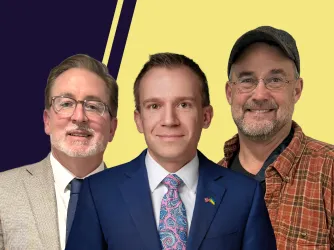Table of Contents
University of Southern California relegates professor to remote teaching for expressing anti-Hamas sentiments

via Annenberg Media
WATCH: Booted from the classroom for calling Hamas “murderers”?
The University of Southern California has barred economics professor John Strauss from teaching on campus for the rest of the semester in response to anti-Hamas remarks he made to pro-Palestinian protesters last week. Strauss will finish out the semester teaching courses on Zoom.
On Nov. 9, students held a protest on the USC campus as part of a worldwide “Shut it Down for Palestine” movement. While walking past a group of protesters gathered at the Tommy Trojan statue, Strauss engaged with them over what he perceived to be anti-Semitic and anti-Israel sentiments.
The kerfuffle started when protesters accused Strauss of stepping on a printed list of Palestinians killed in Israeli airstrikes. (Strauss says that stepping on it was unintentional.) When Strauss passed the protest again later, he said one of the protesters yelled “Shame on you, Professor Strauss. Shame on you.” In response, he yelled “No, shame on you. You people are ignorant. Really ignorant. Hamas are murderers. That’s all they are. Every one should be killed, and I hope they all are.”
A viral video circulated on social media in which Strauss can be heard saying, “Every one should be killed, and I hope they all are.” But the clip was shortened in a way that left out the important context that Strauss’s full comment made clear he was referring only to Hamas, not all Palestinians, when he said “every one should be killed.”
More than a dozen students and faculty filed complaints with the university about Strauss’s comment. Some protesters said they felt threatened, while one student organizer said the comment was hate speech. He “threatened us as students,” she claimed to USC Annenberg Media, “making us feel unsafe in our academic environment.”
On Nov. 10, USC issued a brief statement that it was aware of the video on social media and was looking into the situation. But that same day Strauss received a call from the associate dean of the college, who told him the provost had placed him on paid administrative leave for the rest of the semester.
Initially, the associate dean told Strauss he would only be able to teach his doctoral-level course remotely while on leave, but not his undergraduate course. By Monday, the university backtracked, allowing him to teach both courses remotely. On Tuesday, Nov. 14, the university told the student newspaper Strauss was not on administrative leave but would be teaching his courses remotely for the remainder of the semester.
The “bedrock principle” underlying freedom of expression is that speech may not be restricted on the basis that others find it offensive.
A petition demanding Strauss’s termination for “racist and xenophobic behavior” had more than 6,200 signatures as of Nov. 17. A competing petition demanding his reinstatement had garnered more than 8,100 signatures.
On November 20, FIRE wrote USC, calling on the university to allow Strauss to return to his normal in-person teaching duties on campus.
USC may be a private university not bound by the First Amendment, but its policies commit to protecting faculty speech, so “[w]hen they speak or write as citizens, [faculty] should be free from institutional censorship or discipline[.]” As we explained in the letter, the “bedrock principle” underlying freedom of expression is that speech may not be restricted on the basis that others find it offensive: “As a Nation we have chosen … to protect even hurtful speech on public issues to ensure that we do not stifle public debate.” Nowhere is upholding this principle more important than on a university campus, where debate, and consequently dissent and conflict, are common.
The fact that some protesters characterized Strauss’s comments as “hate speech,” or even threatening to students, does not deprive them of protection under USC’s policies. The standards for punishing speech as a true threat or harassment are high, and Strauss’s remarks to a group of protesters fall far short.
Universities should be places of free inquiry and debate. When Strauss encountered protesters espousing a message with which he disagreed, he engaged with them directly. This is exactly what should happen between those with opposing views. That the “heated exchange of ideas” once common on university campuses appears to be an alien experience for many at USC does not justify their interpreting disagreement and criticism as threatening, or giving countenance to their complaints against Strauss on that basis.
USC’s response to complaints about Strauss’s comment perhaps makes it unsurprising that its students are so unfamiliar with open disagreement and debate.
FIRE defends the rights of students and faculty members — no matter their views — at public and private universities and colleges in the United States. If you are a student or a faculty member facing investigation or punishment for your speech, submit your case to FIRE today. If you’re faculty member at a public college or university, call the Faculty Legal Defense Fund 24-hour hotline at 254-500-FLDF (3533). If you’re a college journalist facing censorship or a media law question, call the Student Press Freedom Initiative 24-hour hotline at 717-734-SPFI (7734).
Recent Articles
Get the latest free speech news and analysis from FIRE.

Free speech in Trump 2.0
Podcast

The Federal Bureau of Investigation (of protected speech)

The paper was her lifeboat — UMD called it interference


